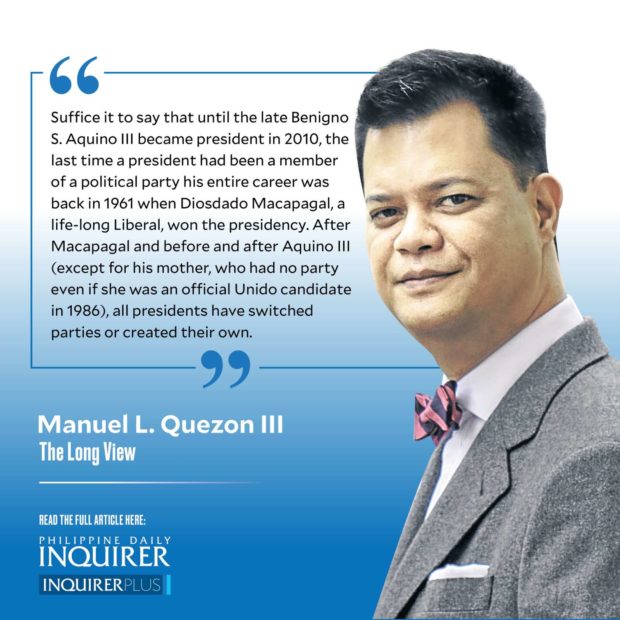Leaders without followers
The late Archbishop Oscar Cruz once said that someone who says God is speaking directly to them probably ought to have their head examined. The dilemma of the aspirant for the presidency is similar. Who is to say their wanting to run for the presidency is anything more than a sign of mental imbalance? In the past, this was solved by participating in rituals that reassured the public there was more behind a candidacy than an inflated sense of self-importance.
There are three ways to arrive at a presidential campaign. The oldest and most traditional, and the most used from 1935 to 1965, is through a political party convention. Of conventions, there are two kinds: the competitive and the ceremonial. Where there are strong incumbents or members of long-standing, like much else in our political culture, the political players prefer the ceremonial, which avoids the nastiness of a public fight; when a party lacks a truly paramount leader, conventions end up competitive, with a corresponding risk: that a sore or sure loser will bolt the party and either set up a wing of that party, or an entirely new party altogether.
Neither of the two major parties had competitive conventions in 1969. With martial law, the long-postponed urge of the political class to return to the prewar one-party system (entirely possible if only Roxas and Magsaysay hadn’t died in 1948 and 1957, respectively) meant not only the demise of the old parties but their convention systems as well. For the opposition, an alternative to (even back then) irredeemably old-fashioned conventions was to put together a council of elders and sectoral leaders through a “Convenor’s Group.”
The third way is through what Randy David calls political impresarios, essentially the producers of presidential campaigns. These persons or small groups of people do the opposite of what political parties used to (claim to) do, which is theoretically have the membership select its leadership and, thus, their standard bearer in a campaign, or what Convenor’s Groups aimed to do, which is to craft a consensus for a unity ticket representing widely differing alignments. Instead, political impresarios latch on to an individual and then find ways to get that person noticed in the surveys, which marks the candidate as a viable one, who can then attract funding, which allows shopping around for a party as an electoral vehicle.
Twenty-three years separated the last “normal” two-party system election in 1969 from the first multiparty “normal” election in 1992. In that year, the political party convention finally died when the ruling administration party failed to resolve who would be its standard bearer: Ramon Mitra Jr. or Fidel V. Ramos. Unable to beat the well-oiled methods of Speaker Mitra, General Ramos in tried-and-tested Filipino fashion, broke away from his party and shopped around for a convenient party vehicle; not having been a politician up to that point, Ramos was thus the first of the modern-style candidates created by virtue of political “impresarioship.”
Among those who did the thinking and maneuvering for Ramos was Antonio Carpio. He thus helped kill off, once and for all, the political party convention as a way for groups to resolve who their candidates should be and, really, the very existence of parties as self-governing organizations bigger than their
(temporary) leaders. Now a retired senior associate justice, Carpio is trying, 30 years to repeat for 2022, what was last successfully attempted in 1985: assembling a group of leaders to help a fragmented opposition unite around a common set of candidates.
As for the other parties, suffice it to say that until the late Benigno S. Aquino III became president in 2010, the last time a president had been a member of a political party his entire career was back in 1961 when Diosdado Macapagal, a life-long Liberal, won the presidency. After Macapagal and before and after Aquino III (except for his mother, who had no party even if she was an official Unido candidate in 1986), all presidents have switched parties or created their own.
All these and more are covered in a two-part podcast series in my podcast which I hope you will consider listening to.
















